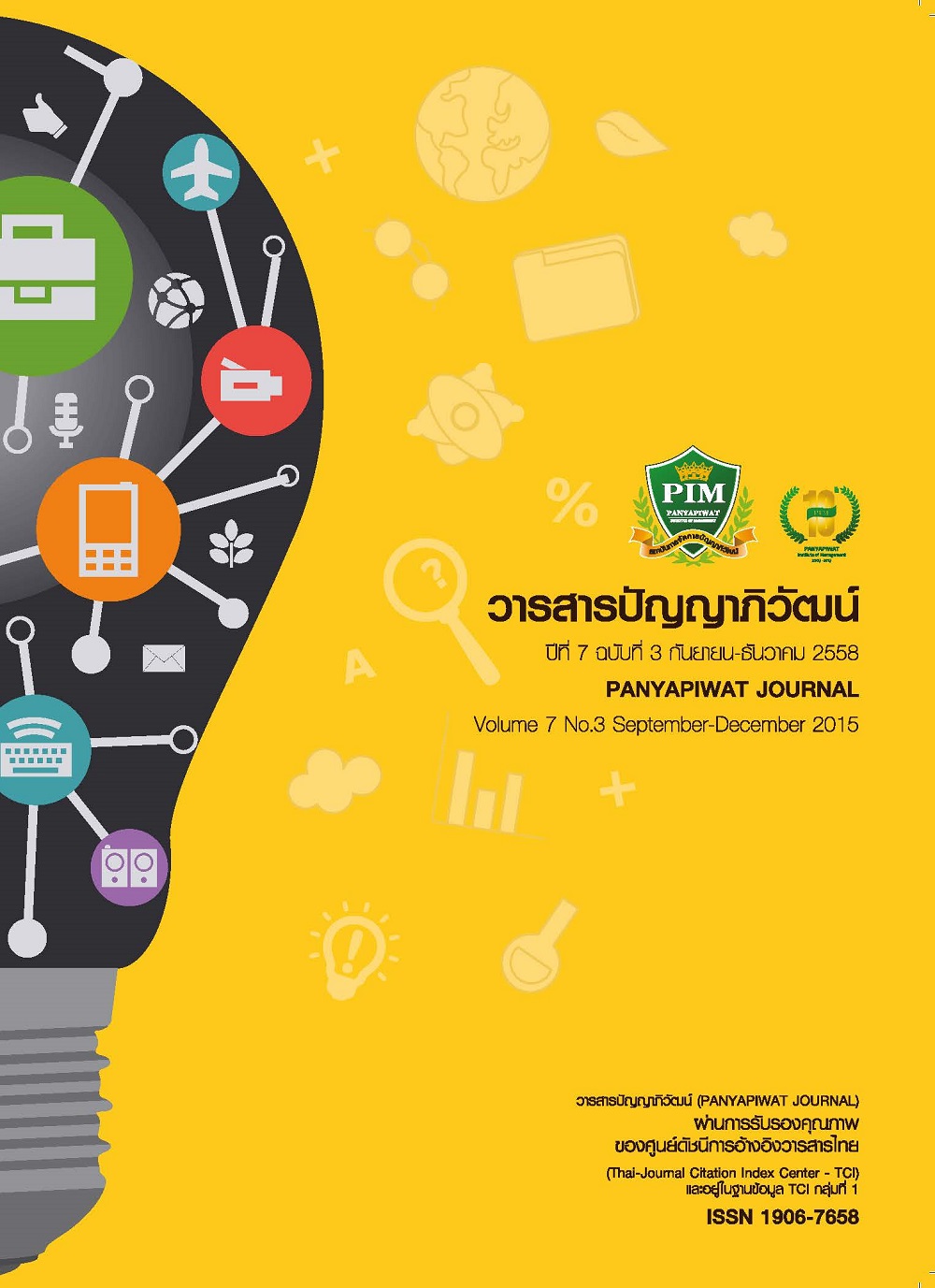ความต้องการมีส่วนร่วมในการจัดการการท่องเที่ยวเชิงนิเวศของ ชาวชุมชนแม่แมะ ตำบลแม่นะ อำเภอเชียงดาว จังหวัดเชียงใหม่
Main Article Content
บทคัดย่อ
การวิจัยนี้มีวัตถุประสงค์เพื่อทราบถึงความต้องการมีส่วนร่วมในการจัดการการท่องเที่ยวเชิงนิเวศของชาวชุมชนในหมู่บ้านแม่แมะ ตำบลแม่นะ อำเภอเชียงดาว จังหวัดเชียงใหม่ ผลการวิจัย พบว่า ประชากรและกลุ่มตัวอย่าง ได้แก่ หัวหน้าครัวเรือนที่อาศัยอยู่ในพื้นที่บ้านแม่แมะ โดยใช้การเลือกกลุ่มตัวอย่างแบบเจาะจง ซึ่งกลุ่มตัวอย่างที่ให้ความสมัครใจในการให้ข้อมูลและเข้าร่วมโครงการวิจัย จำนวน 78 คน ใช้แบบสอบถามในการรวบรวมข้อมูล ผลการวิจัย พบว่า ชาวชุมชนแม่แมะประกอบอาชีพเกษตรกรรม ซึ่งพื้นที่เอื้ออำนวยต่อการทำการเกษตร โดยมีกฎระเบียบของชุมชนที่ร่วมกันตั้งขึ้นในการรักษาสิ่งแวดล้อมของระบบนิเวศน์ให้สมดุล การจัดการการท่องเที่ยวเชิงนิเวศ จะทำให้ตนเองได้รับประโยชน์ในระดับปานกลาง (X = 2.73) การได้รับข้อมูล ข่าวสารเกี่ยวกับการท่องเที่ยวเชิงนิเวศจากสื่อประเภทต่างๆ ในระดับปานกลาง (X = 2.25) ความต้องการมีส่วนร่วมในการจัดการการท่องเที่ยวเชิงนิเวศในระดับมาก (X = 2.40) และความรู้ความเข้าใจเกี่ยวกับการท่องเที่ยวเชิงนิเวศในระดับมาก (X = 8.33) แนวทางการพัฒนาการท่องเที่ยวควรมีกระบวนการท่องเที่ยวแนวใหม่โดยยึดหลักการให้ความรู้ความเข้าใจ การได้รับข้อมูลข่าวสาร การมีส่วนร่วมในการคิด การวางแผน การตัดสินใจ การมีส่วนร่วมในการลงทุน การปฏิบัติ การติดตามและประเมินผล และการรับผลประโยชน์ มุ่งเน้นด้านวัฒนธรรม ศิลปะและประเพณีต่างๆ ที่ดึงดูดนักท่องเที่ยวเพื่อให้เกิดความยั่งยืน
This research aims to study the needs of the community participation in ecotourism management of Mae Mae villagers, Mae Na subdistrict, Chiang Dao district, Chiang Mai province. The population and sample of this research are head of the households living in Mae Mae village. The sample is chosen by Simple Random Sampling and Purposive or Judgmental Sampling methods. 78 villagers volunteered to give the information and attend the research project. The questionnaire was used to collect the data. The research results showed that Mae Mae villagers are the farmer as their area suitable for farming. Mae Mae villagers also set up their community’s rules and regulations in order to keep balance of the ecosystem. The respondents have the opinion that the management of ecotourism benefits themselves is in medium level (X =2.73). The way they get the information about ecotourism via various media is in medium level (X =2.25). The needs of participation in the management of ecotourism is in high level (X =2.40). And the better understanding of ecotourism is in high level (X =8.33). The guideline for tourism development should focus on the new travel paradigm by based on knowledge and understanding, as well as the way to get information. The members should participate in brainstorming, planning, decision making, investment, action, monitoring, evaluating and get benefited by focus on tradition, art and culture in order to get sustainable tourism attraction.
Article Details
“ข้าพเจ้าและผู้เขียนร่วม (ถ้ามี) ขอรับรองว่า บทความที่เสนอมานี้ยังไม่เคยได้รับการตีพิมพ์และไม่ได้อยู่ระหว่างกระบวนการพิจารณาลงตีพิมพ์ในวารสารหรือแหล่งเผยแพร่อื่นใด ข้าพเจ้าและผู้เขียนร่วมยอมรับหลักเกณฑ์การพิจารณาต้นฉบับ ทั้งยินยอมให้กองบรรณาธิการมีสิทธิ์พิจารณาและตรวจแก้ต้นฉบับได้ตามที่เห็นสมควร พร้อมนี้ขอมอบลิขสิทธิ์บทความที่ได้รับการตีพิมพ์ให้แก่สถาบันการจัดการปัญญาภิวัฒน์หากมีการฟ้องร้องเรื่องการละเมิดลิขสิทธิ์เกี่ยวกับภาพ กราฟ ข้อความส่วนใดส่วนหนึ่งและ/หรือข้อคิดเห็นที่ปรากฏในบทความข้าพเจ้าและผู้เขียนร่วมยินยอมรับผิดชอบแต่เพียงฝ่ายเดียว”
เอกสารอ้างอิง
การท่องเที่ยวแห่งประเทศไทย. (2556). การท่องเที่ยวประเทศไทยภาคเหนือ. สืบค้นเมื่อ 20 มิถุนายน 2556, จาก
http://www.thai.tourismthailand.org
การท่องเที่ยวแห่งประเทศไทย. (2557). แนวโน้มการท่องเที่ยวของโลกในปี 2013 และคาดการณ์ปี 2014. สืบค้นเมื่อ 20 มกราคม 2557, จาก http://www.tatreviewmagazine.com
ดวงพร พุทธวงค์ และทรายทอง อุ่นนั้นกาศ. (2557). ความสําเร็จของการมีส่วนร่วมในการจัดกิจกรรมการท่องเที่ยว โดยชุมชน: กรณีศึกษาชุมชนถนนคนเดินกาดกองต้า จังหวัดลําปาง. วารสารปัญญาภิวัฒน์, 5(1), 1-15.
นําชัย ทนุผล และสุนิลา ทนุผล. (2542). พัฒนาชุมชน: หลักการและยุทธวิธี, เชียงใหม่: ภาควิชาส่งเสริมการเกษตรสถาบันเทคโนโลยีการเกษตรแม่โจ้.
พนารัตน์ ลาภเกิน. (2553). แนวทางการพัฒนาการท่องเที่ยวเชิงอนุรักษ์ในจังหวัดสุโขทัย, สารนิพนธ์ (บรรณารักษศาสตร์
และสารนิเทศศาสตร์), กรุงเทพฯ: มหาวิทยาลัยศรีนครินทรวิโรฒ.
พวงรัตน์ ทวีรัตน์. (2540). วิธีการวิจัยทางพฤติกรรมศาสตร์และสังคมศาสตร์ (พิมพ์ครั้งที่ 7) กรุงเทพฯ: ศูนย์หนังสือ
จุฬาลงกรณ์มหาวิทยาลัย.
ไพรัตน์ เดชะรินทร์. (2527). นโยบายและกลวิธีการมีส่วนร่วมของชุมชนในยุทธศาสตร์การพัฒนาปัจจุบันในการมีส่วนร่วมของประชาชนในการพัฒนา กรุงเทพฯ: ศักดิ์โสภาการพิมพ์.
รัฐนันท์ พงศ์วิริทธิ์ธร และภาคภูมิ ภัควิภาส. (2556). รูปแบบการท่องเที่ยวเชิงวัฒนธรรมถนนคนเดินที่เหมาะสมกับนักท่องเที่ยวเพื่อความยั่งยืน มหาวิทยาลัยเทคโนโลยีราชมงคลล้านนา.
โรงเรียนบ้านแม่แมะ. (2552), บริบทบ้านแม่นะ อําเภอเชียงดาว จังหวัดเชียงใหม่ สืบค้นเมื่อ 20 มิถุนายน 2556 จาก http://50103209.thaischool.in.th/
Ban Mae Mae School. (2009). The Context of Ban Mae Na, Chiang Dao District, Chiang Mai Province. Retrieved June 20, 2013, from http://50103209.thaischool.in.th/ [in Thai]
Decharin, P. (1984). Policies and Strategies of Community Participation in Recently Development Strategies of Community Participation. Bangkok: Saksopa Printing. [in Thai]
Lapkern, P. (2010). Guidelines for Eco-Tourism Development of Sukhothai Province. Thesis (Library and information science). Bangkok: Srinakharinwirot. [in Thai]
Pongwiritthon, R. & Pakvipas, P. (2013). Guidelines for Sustainable Chiang Mai Tourism Development According to the Attitude of Tourists. Faculty of Business Administration and Liberal Arts, Rajamangala University of Technology Lanna. [in Thai]
Puangrat, T. (1997). Research Methodoloty in Behavioral and Social Sciences. (7th ed.). Bangkok: Chulalongkorn University Book Center. [in Thai]
Puttawong, D. & Unnanket, S. (2014). The Achievement of Participation in Community-Based Tourism Activities: A Case Study of Kad Kong Ta Walking Street, Lampang Province. Panyapiwat Journal, 5(1), 1-15. [in Thai]
Thanupon, N. & Thanupon, S. (1999). Community Development: Principles and Tactics. Chiang Mai: Department of Agricultural Extension, Maejo Institute of Agricultural Technology. [in Thai]
Tourism Authority of Thailand. (2013). Northern of Thailand Tourism, Trend of Northern of Thailand Tourism for 2013. Retrieved June 20, 2013, from http://www.thai.tourismthailand.org [in Thai]
Tourism Authority of Thailand. (2014). Trend of the World's Tourism in 2013 and Prediction of 2014. Retrieved January 20, 2014, from http://www.tatreviewmagazine.com [in Thai]


